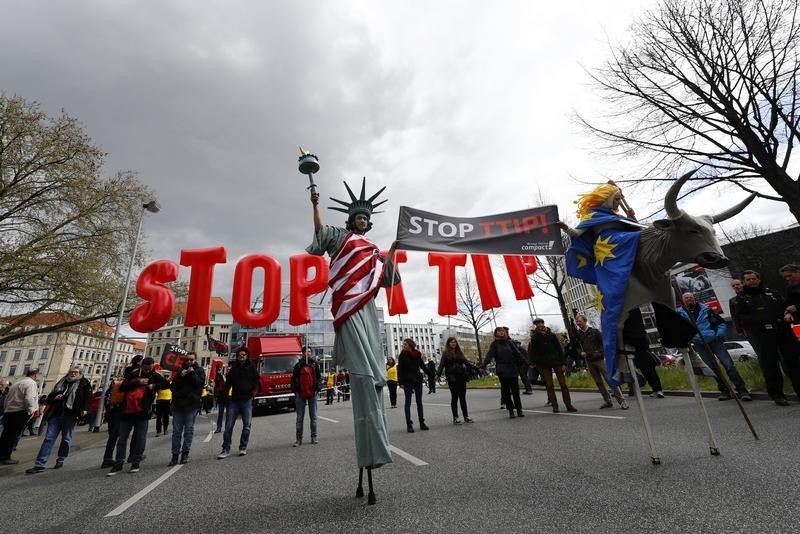
* Test seen as North’s most powerful yet
* Japan protests, sends jets to monitor for radiation
* China begins emergency radiation testing
* South accuses North of “maniacal recklessness”
* UN Security Council to hold closed-door meeting Friday –
dips
(Adds UN, CTBTO estimate, further condemnations)
By Ju-min Park and Jack Kim
SEOUL, Sept 9 (Reuters) – North Korea conducted its fifth
and biggest nuclear test on Friday and said it had mastered the
ability to mount a warhead on a ballistic missile, ratcheting up
a threat that its rivals and the United Nations have been
powerless to contain.
The blast, on the 68th anniversary of North Korea’s
founding, was more powerful than the bomb dropped on Hiroshima,
according to some estimates, and drew condemnation from the
United States as well as China, Pyongyang’s main ally.
Diplomats said the United Nations Security Council would
discuss the test at a closed-door meeting on Friday, at the
request of the United States, Japan and South Korea.
Under 32-year-old dictator Kim Jong Un, North Korea has
accelerated the development of its nuclear and missile
programmes, despite U.N. sanctions that were tightened in March
and have further isolated the impoverished country.
South Korean President Park Geun-hye, in Laos after a summit
of Asian leaders, said Kim was showing “maniacal recklessness”
in completely ignoring the world’s call to abandon his pursuit
of nuclear weapons.
U.S. President Barack Obama, aboard Air Force One on his way
home from Laos, said the test would be met with “serious
consequences”, and held talks with Park and with Japanese Prime
Minister Shinzo Abe, the White House said.
China said it was resolutely opposed to the test and urged
Pyongyang to stop taking any actions that would worsen the
situation. It said it would lodge a protest with the North
Korean embassy in Beijing.
There were further robust condemnations from Russia, the
European Union, NATO, Germany and Britain.
North Korea, which labels the South and the United States as
its main enemies, said its “scientists and technicians carried
out a nuclear explosion test for the judgment of the power of a
nuclear warhead,” according to its official KCNA news agency.
It said the test proved North Korea was capable of mounting
a nuclear warhead on a medium-range ballistic missile, which it
last tested on Monday when Obama and other world leaders were
gathered in China for a G20 summit.
Pyongyang’s claims of being able to miniaturise a nuclear
warhead have never been independently verified.
Its continued testing in defiance of sanctions presents a
challenge to Obama in the final months of his presidency and
could become a factor in the U.S. presidential election in
November, and a headache to be inherited by whoever wins.
“Sanctions have already been imposed on almost everything
possible, so the policy is at an impasse,” said Tadashi Kimiya,
a University of Tokyo professor specialising in Korean issues.
“In reality, the means by which the United States, South
Korea and Japan can put pressure on North Korea have reached
their limits,” he said.
UNPRECEDENTED RATE
North Korea has been testing different types of missiles at
an unprecedented rate this year, and the capability to mount a
nuclear warhead on a missile is especially worrisome for its
neighbours South Korea and Japan.
“The standardisation of the nuclear warhead will enable the
DPRK to produce at will and as many as it wants a variety of
smaller, lighter and diversified nuclear warheads of higher
strike power,” KCNA said, referring to the country’s formal
name, the Democratic People’s Republic of Korea.
It was not clear whether Pyongyang had notified Beijing or
Moscow of its planned nuclear test. Senior officials from
Pyongyang were in both capitals this week.
Chinese Foreign Ministry spokeswoman Hua Chunying said she
had no information to provide when asked if China had advance
warning of the test, and would not be drawn on whether China
would support tougher sanctions against its neighbour.
Although Beijing has criticised North Korea’s nuclear and
missile tests, it has repeatedly expressed anger since the
United States and South Korea decided in July to deploy the
Terminal High Altitude Area Defense (THAAD) anti-missile system
in the South.
China calls THAAD a threat to its own security and will do
nothing to bring North Korea back to the negotiating table on
its nuclear programme.
Preliminary data collected by the Vienna-based Comprehensive
Nuclear-Test-Ban Treaty Organization (CTBTO), which monitors
nuclear tests around the world, indicates the magnitude – around
5 – of the seismic event detected in North Korea on Friday was
greater than a previous one in January.
Jeffrey Lewis of the California-based Middlebury Institute
of International Studies said the highest estimates of seismic
magnitude suggested this was North Korea’s most powerful nuclear
test so far.
He said the seismic magnitude and surface level indicated a
blast with a 20- to 30-kilotonne yield. Such a yield would make
this test larger than the nuclear bomb dropped by the United
States on the Japanese city of Hiroshima in World War Two.
“That’s the largest DPRK test to date, 20-30kt, at least.
Not a happy day,” Lewis told Reuters.
South Korea’s military put the force of the blast at 10
kilotonnes, which would still be the North’s most powerful
nuclear blast to date.
“The important thing is, that five tests in, they now have a
lot of nuclear test experience. They aren’t a backwards state
any more,” Lewis said.
(Reporting by Jack Kim, Ju-min Park, James Pearson, Se Young
Lee, Nataly Pak, and Yun Hwan Chae in SEOUL; Additional
reporting by Ben Blanchard in BEIJING, Kaori Kaneko and Linda
Sieg in TOKYO, Kirsti Knolle in VIENNA and Eric Beech and
Michelle Nichols in WASHINGTON; Writing by Tony Munroe; Editing
by Raju Gopalakrishnan and Ian Geoghegan)











